Posts Tagged ‘Boris Novak’
PEN Journey 24: Moscow—Face Off/Face Down: Blinis and Bombs—Welcome to the 21st Century
PEN International celebrates its Centenary in 2021. I’ve been active in PEN for more than 30 years in various positions and now as an International Vice President Emeritus. With memories stirring and file drawers of documents and correspondence bulging, I am a bit of a walking archive and have been asked by PEN International to write down memories. I hope this personal PEN journey will be of interest.
“Contrary to our tradition, this year’s PEN Congress is being held in a country in which a massive, genocidal military and paramilitary operation is under way. Besides mass murder, the crimes perpetrated against the civil population of Chechnya include deportation, rape, torture, destruction and theft of personal property as well as the systematic looting and destruction of the material bases of Chechnyan culture and civilization. At the same time, freedom of information has been severely curtailed, and the official propaganda plays on xenophobic and even racist ethnic stereotypes…” So began a Declaration from the 67th World Congress of International PEN voted by the Assembly of Delegates in May, 2000.
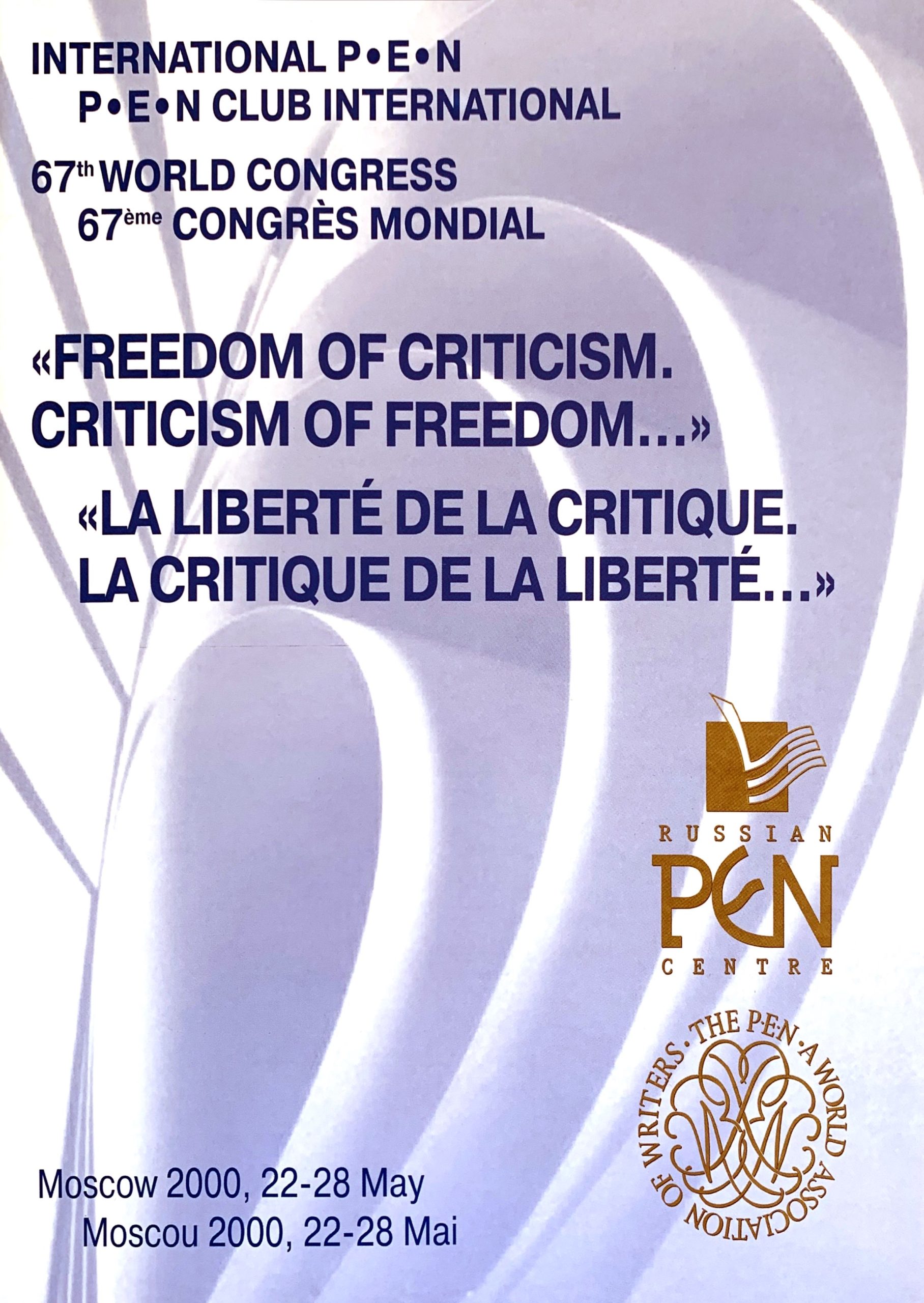
Program for PEN International 67th World Congress, Moscow
The decision to hold the International PEN Congress in Moscow was a controversial one, resulting in some members refusing to attend because of Russia’s prosecution of the war in Chechnya and the concern that holding a Congress in Moscow would give the government an appearance of approval. However, PEN’s Secretariat with the new Executive Committee concluded that the long-planned millennial Congress also presented the opportunity for International PEN to show solidarity with Russian PEN which had been outspoken both on the war and on behalf of Russian journalists and writers under pressure.
“The writers of Russia, united under the auspices of the Russian Centre of the International PEN Club, are concerned about the escalation of the war in Chechnya which is becoming a threat to not only peaceful residents of Grozny-city but also to the national security of Russia. The ultimatum announced to women, children and old people of the Chechen capital makes them hostages of both terrorists and federal forces. It is hard to believe that in this situation the Russian authorities are going to use the same methods as terrorists. We are very aware how hard it is to cut the tight Chechen knot, but in any case innocent people do not have to become victims of the decisions taken…” Russian PEN sent this appeal earlier to the acting President of the Russian Federation, Vladimir Putin.
Russian PEN members, including President Andrei Bitov, had signed the appeal. Russian PEN’s General Secretary Alexander (Sascha) Tkachenko noted at the Congress that it was essential to call on all those involved—Russian and Chechen—to cease their brutalities. Sascha himself had regularly stood up to the Russian government. He championed the cases of imprisoned writers Alexandr Nikitin and Grigory Pasko, both of whom had recently been freed after trials. Pasko, who was a journalist and former Russian Naval officer, had been arrested and accused of espionage for his publication of environmental problems in the Sea of Japan. Nikitin, a Naval officer, had been charged with stealing state secrets by contributing to a report that revealed the sinking of Russian nuclear submarines and the dangers these decaying submarines posed to the environment.
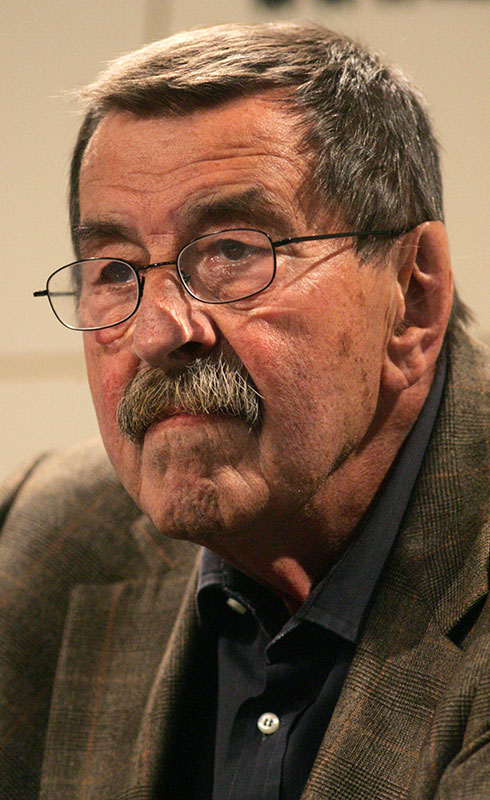
German novelist Günter Grass talk opened PEN’s 67th Congress
The freedom and the openings which many embraced after the break-up of the Soviet Union in the early 1990’s were beginning to close down and restrictions tighten. At the Moscow Congress Pasko expressed his gratitude for everything PEN had done to obtain his freedom. He urged the Assembly to focus on environmental problems. But he warned that the structure of the current Russian government had grown out of the KGB, and he feared nothing good would come for free speech or the environment.
In the opening address of the Congress German novelist Günter Grass, who won the Nobel Prize for Literature the previous year, recounted the many times in the past century that writers had called attention to the abuses and genocides which governments had tried to hide. “At least literature does achieve this—it does not turn a blind eye; it does not forget; it does break the silence,” Grass concluded.
The Congress theme “Freedom of Criticism. Criticism of Freedom…”seemed a particularly UNESCO title, with a focus on how freedom is exercised, noting that freedom unrestrained by morality can lead to a license for corruption, brigandage, state terrorism, censorship and the wanton murder of those who dare to speak out. “That freedom is a double-edged sword is a fact long appreciated in free societies. It is what prompted Voltaire to place a limitation upon it, when it interfered with the freedom of another,” one Congress description noted.
Thus framed, the panels and the work of PEN’s committees proceeded. Many wondered how able PEN members would be to criticize openly as we met both formally and in cafes sharing conversation and meals of blinis and caviar. There was no incident nor interference that I recall at the Moscow Congress nor at the subsequent programs in St. Petersburg, but we were all aware that repercussions could follow after we left. Over time Putin’s government did close down the space for NGO’s with Russian PEN as one of the early targets. (Future blog post.)
The Moscow Congress itself proved an opportunity to celebrate Russian literature and other literature as well as to conduct the work of PEN’s committees which met in halls named after Tolstoy, Pushkin, and Chekov. Many writers from over 70 PEN centers were visiting Moscow for the first time since the Soviet Union broke apart. Since my first trip in 1991 shortly after the coup attempt (PEN Journey 8), the city had changed. Western hotels, restaurants and stores had moved in; certain citizens had amassed wealth; others had lost jobs and security. It was a city of contrasts with children on the street begging, but begging by playing violins. A wealthy new group crowded the lobbies of western hotels and department stores.
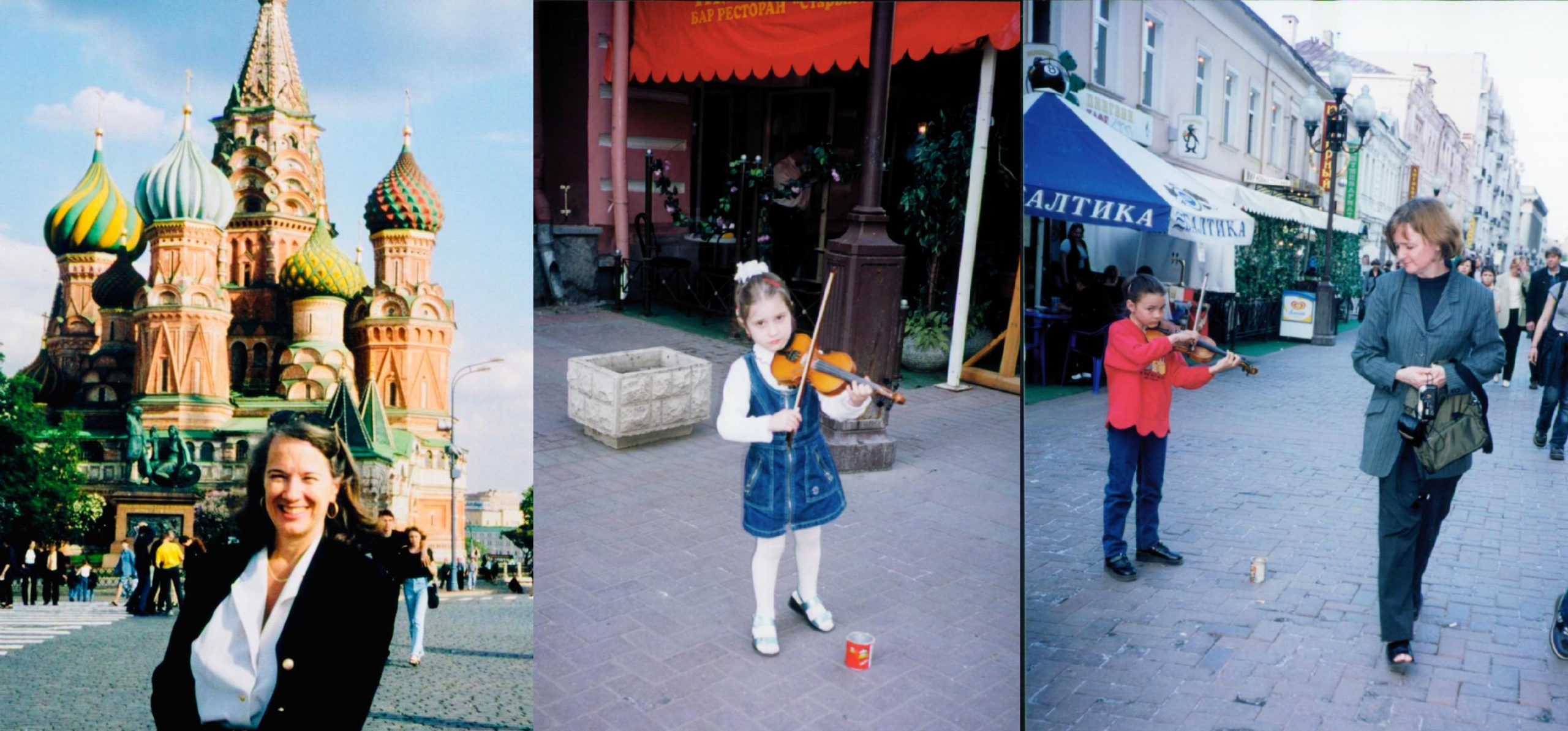
On the streets at PEN Congress in Moscow May, 2000: L: Joanne Leedom-Ackerman, PEN Vice President; R: Sara Whyatt, PEN Writers in Prison Committee Program Director
In a message to the Congress Andrei Bitov wrote:
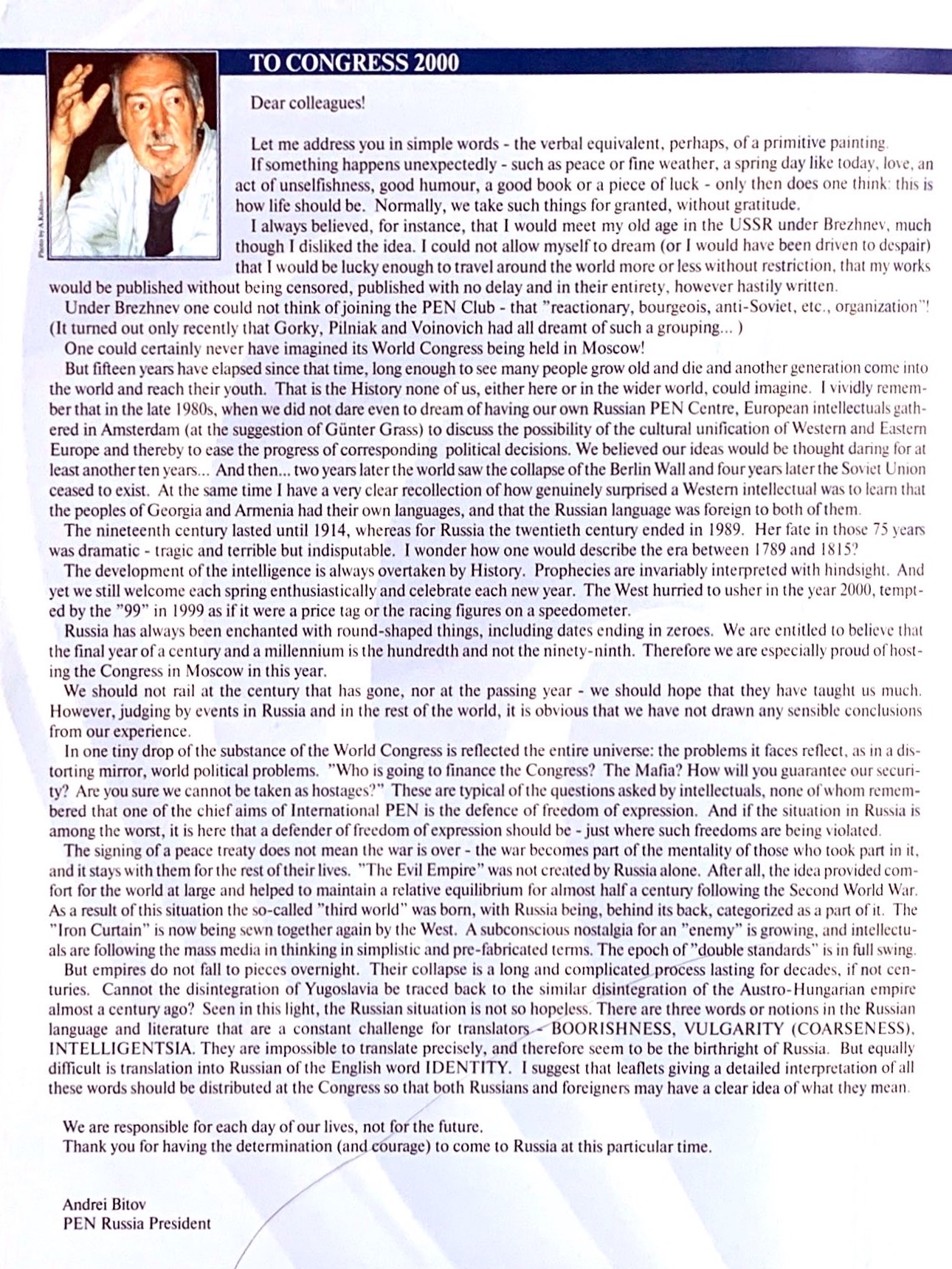
Full text of Russian PEN President Andrei Bitov’s message to PEN delegates
I always believed…that I would meet my old age in the USSR under Brezhnev, much though I disliked the idea. I could not allow myself to dream (or I would have been driven to despair) that I would be lucky enough to travel around the world more or less without restriction, that my works would be published without being censored, published with no delay and in their entirety, however hastily written.
Under Brezhnev one could not think of joining the PEN Club—that “reactionary bourgeois, anti-Soviet, etc., organization”! (It turned out only recently that Gorky, Pilniak and Voinovich had all dreamt of such a grouping…)
One could certainly never have imagined its World Congress being held in Moscow!
But fifteen years have elapsed since that time, long enough to see many people grow old and die and another generation come into the world and reach their youth. That is the History none of us, either here or in the wider world, could imagine…
We should not rail at the century that has gone, nor at the passing year—we should hope that they have taught us much. However, judging by events in Russia and in the rest of the world, it is obvious that we have not drawn any sensible conclusions from our experience…
In one tiny drop of the substance of the World Congress is reflected the entire universe, the problems it faces reflect, as in a distorting mirror, world political problems…
We are responsible for each day of our lives, not for the future.
Thank you for having the determination (and courage) to come to Russia at this particular time.
PEN’s business at the Assembly of Delegates included the International Secretary Terry Carlbom’s report on PEN’s relationship with UNESCO as the only global organization representing literature associated with UNESCO and a preliminary notice about a multi-year strategic plan under development. Business also included the election of the International President. Homero Aridjis was standing for a second term, and former International Secretary Alexander Blokh of Russian origin had returned to this PEN Congress for the first time since he’d stepped down as International Secretary in 1998, (PEN Journey 20) and he was also running for President. I was asked to chair the Assembly for the election, including during a stir that arose when Alex wasn’t present to speak for his candidature. He’d left the meeting early for an appointment, mistakenly thinking he would speak in the afternoon. However, there was no afternoon session, and controversy arose over whether the election should be postponed so he could speak. I ruled that he would be the first item on the morning agenda and then the election would proceed as scheduled. Homero Aridjis won a second term; Alexander Blokh continued to serve PEN for many years as a Vice President and President of French PEN.
Also at the Congress Martha Cerda (Guadalajara Center) succeeded Lucina Kathmann as Chair of the Women Writers’ Committee; Veno Taufer (Slovene PEN) succeeded Boris Novak, who’d opposed holding the Congress in Moscow and had stepped down as chair of the Writers for Peace Committee, and Eugene Schoulgin (Swedish PEN) was confirmed as the new Writers in Prison Committee Chair.
In his farewell comments as WiPC chair Moris Farhi quoted Günter Grass’s address that literature always breaks the silence. Moris added that by breaking the silence, by telling the truth and exposing wrong-doing, literature also defied fear and embraced courage. The members of International PEN had witnessed this defiance of fear and the manifestation of courage time and again. Moris noted among those with courage were Grigory Pasko, Alexander Tkachenko and our colleague Boris Novak.
The Moscow Congress saw the return of delegates from Chinese PEN after a decade-long absence post Tiananmen Square. Two resolutions on China were presented, one calling for the release of dissident writers imprisoned in China and another protesting the long prison terms for writers in Tibet. The Chinese delegate objected to both resolutions, arguing first that Tibet shouldn’t be singled out as though it were not part of China. He also said that the Chinese people and Chinese writers cared for human rights after centuries of feudal society, but the West emphasized individual rights and values while the Chinese valued collective human rights and obligations to the family and society. The Chinese believed that human rights in a given country were related to the social system, the level of economic development and historical and cultural traditions of that country, and they encompassed the right to development and subsistence. A country of more than 1.2 billion people had to find food and clothing. It was impossible for one pattern to solve all existing problems. The Cold War had ended, but its influence remained with those who believed their values, their concept of human rights, their position were the only correct ones in the world. Dialogue was the only way to resolve the differences of view, a dialogue based on equality and mutual respect.
Hands shot up seeking to respond. At least 25 delegates at the Assembly spoke, welcoming the return of the Chinese delegates to the PEN Congress, but most taking exception to the argument of the relativity of human rights in PEN’s work. The first to speak was Eric Lax of PEN Center USA West who said he appreciated the speaker’s comments but wanted to add that the PEN Charter, to which all members subscribed, was very clear that freedom to write was a basic tenant of the organization and that information should pass unimpeded without restriction. Some questioned the way the resolution was written. Alexander Tkachenko of Russian PEN said he felt PEN should be understanding of people living under a regime about which the rest of PEN knew little. It was up to the Assembly to decide whether to support the resolution; they needn’t accept the Chinese delegate’s opinion, but they should respect it. He didn’t want the Chinese to be missing from PEN for another ten years. PEN should be tolerant of those for whom it was extremely dangerous to discuss such questions. The Assembly applauded. A small amendment was made to the resolutions, both of which passed with large majorities, though not unanimously.
The following year the Independent Chinese PEN Center (ICPC) came into being, a center of independent writers and democracy activists inside and outside of China. One of the founding members and the second president of ICPC (2003-2007) was writer Liu Xiaobo, on whose behalf PEN worked twice when he was imprisoned after Tiananmen Square and again when he was arrested in 2009. Liu Xiaobo was the first Chinese citizen to win the Nobel Prize for Peace in 2010, but he was incarcerated in a Chinese jail, and he died in custody in 2017.
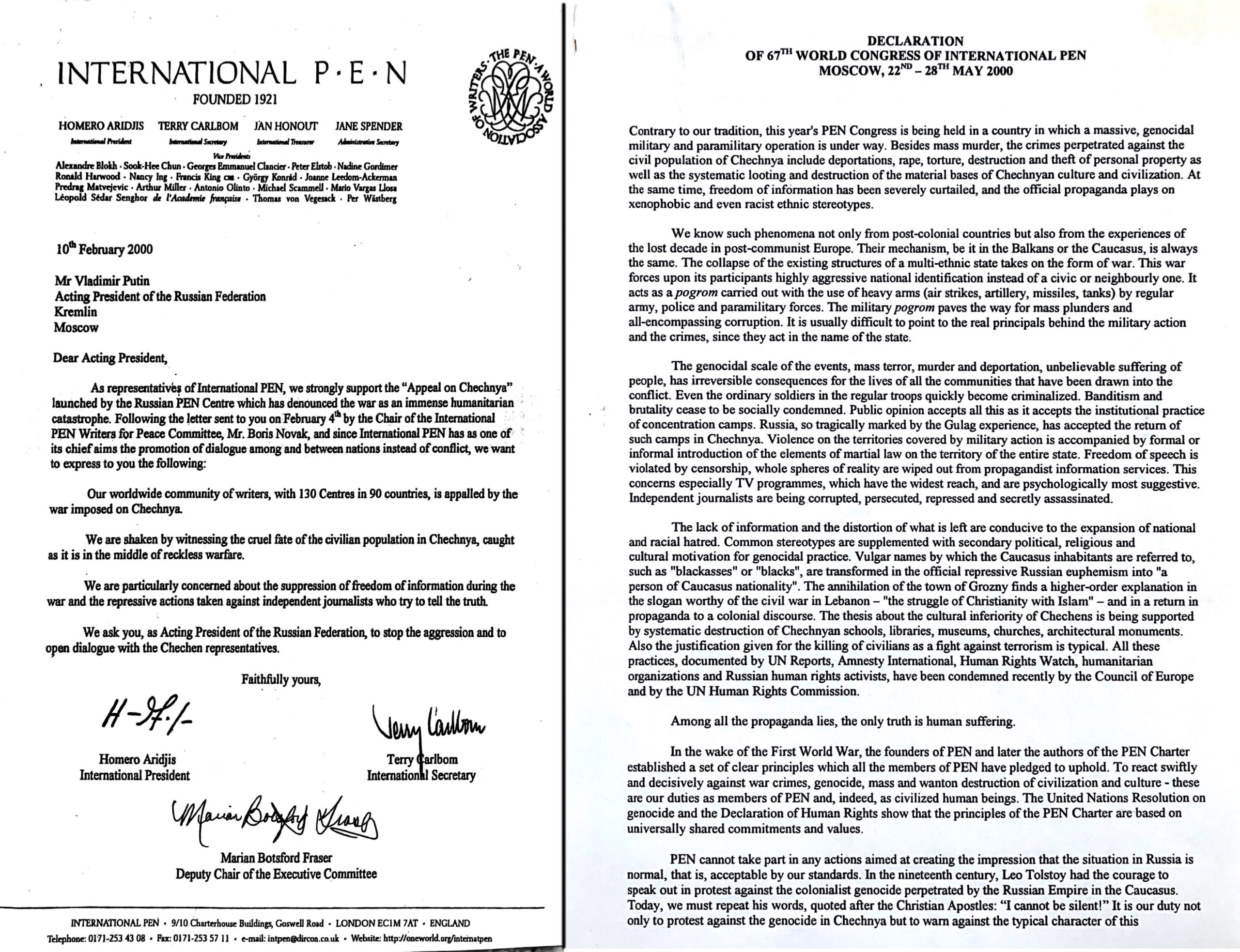
Next Installment: PEN Journey 25: War and more War: Retreat to London
PEN Journey 16: The Universal, the Relative and the Changing PEN
PEN International celebrates its Centenary in 2021. I’ve been active in PEN for more than 30 years in various positions and now as an International Vice President Emeritus. With memories stirring and file drawers of documents and correspondence bulging, I am a bit of a walking archive and have been asked by PEN International to write down memories. I hope this personal PEN journey will be of interest.
Fremantle, Australia is far away, at least if you live in the Americas or Europe or West Africa. So is Tokyo, Manila, Nepal, Hong Kong,—all destinations of PEN Congresses and conferences. As a global organization with centers in over 100 countries, PEN tries to cover the world with its meetings and at least once or twice a decade organize a Congress in Asia or Australia with its centers there.
 In 1995 for PEN International’s 62nd Congress Perth PEN hosted delegates from around the world in Fremantle, a port city on Australia’s western coast in the Perth metropolitan area, a picturesque city with Victorian architecture and, as I recall at the time, a town out of the 1960’s where time hadn’t quite caught up. The city’s reputation was partially derived from its history as a penal colony from the 1850’s to 1991. The traditional Aboriginal people who lived there called the area Walyalup “the crying place.”
In 1995 for PEN International’s 62nd Congress Perth PEN hosted delegates from around the world in Fremantle, a port city on Australia’s western coast in the Perth metropolitan area, a picturesque city with Victorian architecture and, as I recall at the time, a town out of the 1960’s where time hadn’t quite caught up. The city’s reputation was partially derived from its history as a penal colony from the 1850’s to 1991. The traditional Aboriginal people who lived there called the area Walyalup “the crying place.”
The 65th Congress was one of the smaller for PEN, less formal with many delegates staying in the homes of local writers rather than in a hotel. Instead of formal receptions in houses of state, at least one evening’s entertainment was a game of literary trivia and bingo. Because the venue was on the harbor, the swimmers among the delegates, particularly Sascha (Alexander Tkachenko) General Secretary of Russian PEN, tried to swim each day despite the warnings that waters were shark-infested. Sascha defied the sharks which he considered a milder threat than what he was dealing with back home in Russia.
The Congress theme Freedom of Expression and Cultural Context translated into an endorsement of the universality of human rights as expressed in the Universal Declaration of Human Rights. Held in the 50th anniversary year of the United Nations’ founding, PEN insisted human rights were not a relative notion. “While the concept of a universal right may not have penetrated the mechanisms of all states, the invocation of the universal right to free expression remains one of the essential tools that PEN and other organizations use to apply pressure and insert a wedge into the conscience of nations,” the Writers in Prison Chair’s report noted that year.
While certain human rights were absolute, governance was relative, and PEN itself was beginning to struggle with its structure. The relaxed atmosphere of Fremantle allowed informal discussions among delegates who were urging a more democratic structure for PEN. As PEN International headed towards its 75th anniversary the following year, Boris Novak, Slovene PEN President and Chair of the Peace Committee noted that the inner structure of PEN was no longer adequate for the needs of such a large global organization. This sentiment was echoed by the American PEN delegate and delegates from Scandinavian centers. The International Secretary agreed to hold a special meeting in Perth on this question, and the discussion and the dissent began.
As chair of the Writers in Prison Committee, I shared the concerns, but the WiPC staff and I determined that the Writers in Prison Committee should remain a place where everyone came together and focused on the mission of getting writers out of prison and securing freedom of expression so we stayed on the edge of the debate. The internal politics of PEN were stirring and erupted a year later at the 1996 Congress in Guadalajara. In Perth, however, the breezes were balmy and the water warm enough to dip in if not to cross the distance between the old and the new. That process would evolve over the next several years and Congresses to come.

Brief summary of work follows in this excerpt from my 1995 Writers in Prison Committee Chair report:
“Since [he] was arrested, my relatives and close friends have not dared to speak to me or telephone me for fear of being arrested. They have steered clear of me. I can count on the fingers of one hand the number of friends and relatives who have stood by me. Since our problems began, I have had to rely on my family and our friends from abroad…I am very grateful to them…In short, your support will not only help my family, but also the families of others who are in distress. We will never forget your help.”
—Letter to PEN WiPC from the wife of an imprisoned writer who for reasons of security must remain anonymous.
“The work of the Writers in Prison Committee this year has included appeals on writers’ behalf to 59 countries, around 150 appeals from the London office and hundreds more from centers around the world who responded to PEN’s Rapid Action calls and to the specific cases of the prisoners they have adopted…
“The fiftieth anniversary of the end of World War II saw celebrations in Europe but also saw a resurgence in racist and hate literature and speech. Anti-fascists writers found themselves threatened, especially in Austria where one writer was almost murdered. Turkey continued to be the most difficult country in the region with over 200 arrests, brief detentions, killings and disappearances, almost all relating to writings on the Kurdish situation…
“The other issues to watch—the rise of militant fundamentalism, terrorism, separatist movements—but these are generally issues over which PEN has little control even though they affect the fates of individual writers…
“Progress this year can best be measured in the releases of prisoners and also by the changes in certain countries’ laws. The Writers in Prison Committee lobbied governments and international bodies on general issues such as the death penalty, long term imprisonment and anti-terror laws and has seen some effect. PEN, along with other human rights organizations, urged the Indian government to reform or abandon its anti-terrorist law under which writers were detained, and recently the government has voted not to renew the law. The WiPC has also spent a large effort speaking with representatives of the Turkish government at embassies and at the United Nations to urge the amendment or abolishment of Article 8 of the Anti-Terror Law. Just last week the Goverment finally announced its plan to amend the law. We are hopeful this will soon take place in such a way that hundreds of writers detained because of Article 8 will no longer face prison terms, though we are cautious in our optimism.
“The main substance of the Writers in Prison Committee work, however, is not shown in the statistics nor through the reformed government policy, but can best be measured in the lives of individual writers. This year over 90 writers have been released from prison and some individuals facing severe penalties, including death, have instead received clemency. Unfortunately in many countries as one writer walks out of prison, another is being brought in…
“Turkish writer Esber Yagmurdereli, who is blind, recently had his 20-month prison sentence ratified. He was arrested for a speech about the Kurdish situation at a human rights meeting just weeks after his release from 13 years in prison. [I’d like to end with] an excerpt from one of his plays, “Crossing Boundaries” which deals with the experience of a political prisoner:
The moment lost all sense of time and the door opened
You were leaving…the anguish would lift from your heart
…Your unconquered eyes would be mine from now on.
…You went and waking to your absence was to be condemned to a harsh fate
And I felt the damnation again when I heard my forehead crack against these silent walls
…Suddenly I was without a country like so many Palestinians
I even forgot my language: I forgot I was a scream in the river of your voice
(Didn’t we force these walls to memorize our voices
Didn’t we breastfeed these rotten cells our best folk songs?)
We set alight wet stones as we rested our backs against them…
…I kept biting my lips, but never forgot the memory…
And as the moon fell into the night, I saw your smile in its eternal beauty
The rainbow shone on your forehead and its greeting was a declaration
…then that moment lost all sense of time and the door opened
The silenced suddenly arose and spirits soared like rain-birds.”
Next Installment: PEN Journey 17: Gathering in Helsingør
PEN Journey 14: Speaking Out: PEN’s Peace Committee and Exile Network
PEN International celebrates its Centenary in 2021. I’ve been active in PEN for more than 30 years in various positions and now as an International Vice President Emeritus. With memories stirring and file drawers of documents and correspondence bulging, I am a bit of a walking archive and have been asked by PEN International to write down memories. I hope this personal PEN journey might be of interest.
With a blue glacial lake surrounded by the Alps, a small island in the center with an ancient church with a Wishing Bell that rang out and promised fulfillment for the wishers, with a castle perched atop a hillside—with beauty and history intertwined through the landscape, Bled, Slovenia offered a stunning venue for PEN International’s Peace Committee meetings.

Bled, Slovenia
In the heart of Europe, the Peace Committee sat in the heart of a contradiction, for there were few places less peaceful than the Balkans. Yet Slovene PEN members played an important role as did other PEN members in bridging divides among writers in conflict zones.
At the Peace Committee’s inception in 1984, Slovenia was part of Yugoslavia, one of a handful of Communist countries after World War II whose writers were able to sign PEN’s Charter which endorsed freedom of expression. The other countries included Poland, East Germany, Czechoslovakia, Bulgaria, and Hungary. In 1962 a well-known Slovene writer, who was a member of English PEN but returned each year to Slovenia, championed the idea of resurrecting the Slovene PEN center which had existed before the war as well as the other two Balkan PEN Centers—Croatia and Serbia.
In 1965 writers from these Yugoslav centers took on the task of staging an International PEN Congress in Bled. At the congress Arthur Miller presided as the first and only American President of International PEN. At the ’65 Bled Congress PEN also hosted for the first time Soviet writers as observers. “Almost despite myself I began feeling certain enthusiasm for the idea of international solidarity among writers, feeble as its present expression seemed,” Miller wrote in his autobiography Timebends. “…I knew that PEN could be far more than a mere gesture of goodwill.”
It took almost 25 years before a Soviet, and later Russian, PEN Center emerged. [see PEN Journey 3, 6, 8] During the Cold War it was difficult for writers from the East and West to communicate, but at PEN congresses and meetings and at the Peace Committee, writers debated, exchanged ideas and shared literature. The Peace Committee became a haven during the Balkans War and also a meeting ground for writers from other conflict areas.
Unlike the Writers in Prison Committee which worked to protect and liberate individual writers, it was difficult at times to define the concrete actions the Peace Committee could take, but at least three stand out in my memory—one direct action, one initiative and one rigorous debate on a pressing issue.
As noted in an earlier post [PEN Journey 7] the head of Slovene PEN, Boris Novak ran the barricades during the Balkans War with aid for writers in the besieged Sarajevo as did Slovene poet and future Peace Committee Chair Veno Taufer and others. At the Peace Committee meeting in 1994 Boris reported 100,000 DEM ($60,000) had been contributed from PEN centers around the world and delivered to almost 100 Bosnian writers in order to save lives. When a new Bosnian center was elected at PEN’s Congress in late 1993, the Bosnian center began taking over the delivery of aid, and Boris was elected chair of the Peace Committee.

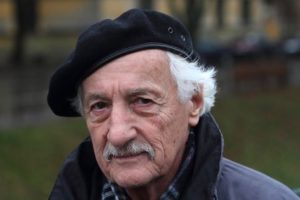
Boris Novak. Photo credit: The Bridge Magazine Veno Taufer. Photo Credit: Alchetron
I attended my first Peace Committee Conference as Chair of PEN’s Writers in Prison Committee in 1994 at the midway point of the Sarajevo siege. At the time PEN was also being asked to help writers who managed to get out of the city. In London I’d met one of these Bosnian writers and gave him my son’s old computer which he accepted as if I’d given him the keys to the city for he had no means to write. Writers fleeing not only the Balkans but situations in Africa and the Middle East needed support as they landed in new locations. It was at the Peace Committee meeting in 1994 that PEN’s Exile and Refugee Network was first conceived in partnership with the Writers in Prison Committee. The initiative was confirmed at the PEN Congress later that fall in Prague.
This initiative for exiles and refugees moved into an exploratory phase which became a leit motif in PEN’s work over the next two decades as it had been in the decades past. PEN’s Exile Network, spearheaded by PEN Centers, including Canada, Sweden, Norway, Germany, Belgium, England, America and many others took the initiative and offered residencies, aid and services to refugee and exiled writers arriving in their countries. Eventually PEN International formed a partnership with the expiring Parliament of Writers Cities of Asylum. In 2006 PEN became a founding member of ICORN—International Cities of Refuge Network. [More in future blog post]
The following year in 1995 the Peace Committee meeting in Bled featured a debate on hate speech, seen as both cause and effect in the conflicts. The gathering included such intellectual luminaries as Adam Michnik, an architect of Poland’s Solidarity movement and editor of the leading newspaper Gazeta Wyborcza in Warsaw. The debate was lively over the incendiary nature of hate speech and the limitations that should be imposed. Both in the Balkans War and in the civil war in Rwanda, which had just ended the year before, hate speech and writing fueled the strife. In spite of PEN’s advocacy for free expression, PEN also called on its members “to use what influence they have in favour of good understanding and mutual respect between nations and people” and pledge “to do their utmost to dispel all hatreds.” Even as “PEN declares for a free press and opposes arbitrary censorship,” it recognizes “freedom implies voluntary restraint” and members pledge “to oppose such evils of a free press as mendacious publication, deliberate falsehood and distortion of facts for political and personal ends.”
The very Charter of PEN contained the axis of the debate. What were or should be limits on expression? Should PEN take a position? At the 1995 Peace Committee conference and in debates since, the views tended to fall according to cultural and national experience. Those in Europe, Africa and elsewhere who had experienced effects of hate speech urged stricter limitations on speech; whereas Americans, bred on the First Amendment of the U.S. Constitution, remained wary of limits and argued that the answer to offensive speech was more speech, the drowning out of harmful ideas with inspiring ones. In my notes of the meeting and debate that year, I find no consensus or clear recommendation except for a reminder from one speaker who knew and quoted Russian exile and dissident Aleksandr Solzhenitsyn: “Don’t go against your conscience and don’t tell lies!”
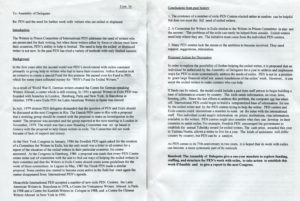
Proposal at 61st Congress for PEN to explore setting up an Exile Network. Resolution passed.
Next Installment: PEN Journey 15: Speaking Out: Life and Death
PEN Journey 7: PEN in Times of War and Women on the Move
PEN International celebrates its Centenary in 2021. I’ve been active in PEN for more than 30 years in various positions and now as an International Vice President Emeritus. With memories stirring and file drawers of documents and correspondence bulging, I am a bit of a walking archive and have been asked by PEN International to write down memories. I hope this personal PEN journey will be of interest.
Iraq invaded Kuwait August 2, 1990. When I picked up my 10-year old son from camp in the U.S. that summer and told him what had happened, his first response was: What about Talal and Alec? These were two of his good friends at the American School in London—one was son of the Kuwaiti Ambassador; the other was from Iraq. He quickly understood the consequences. Fortunately, both of his friends had been out of their countries at the time, though I don’t recall Alec returning to the American School that fall. When the bombs dropped on Baghdad in January, the American School went into lockdown. The older students were issued identity cards. The security force around the school multiplied. When Talal came over to play that winter, he was accompanied by two imposing body guards who stayed outside.
Though the fighting in Iraq concluded by the end of February, security in London continued. By the end of March, the war in the Balkans had begun. Both wars brought to a close the honeymoon many felt after the fall of the Berlin Wall.
For PEN, the outbreak of war in Iraq and in the Balkans led to the cancellation of the planned Delphi Congress and to the convening of conferences in Europe and a two-day gathering of PEN’s Assembly of Delegates and international committees in Paris in April 1991. Delegates from 39 PEN centers came together to conduct the business of PEN at the Société des Gens de Lettres de France which occupied the 18th-century neoclassical Hôtel de Massa on rue de Faubourg-Saint-Jacques in the 14th arrondissement of Paris. There were no literary sessions or social gatherings, or the usual simultaneous translation of proceedings. The business was conducted primarily in English with intermittent French, the two official languages of PEN. (Spanish was added a few years later as PEN’s third official language.)
The Gulf War, the ethnic conflict in the Balkans, the aftermath of the Tiananmen Square trials and the ongoing fatwa against Salman Rushdie predominated discussions in Paris and later in November at the 56th PEN Congress in Vienna. The Gulf War had resulted in increased numbers of writers imprisoned and killed in the Middle East and an increase in censorship. Resolutions condemning the detention and imprisonment of writers in Saudi Arabia, Syria, Israel and Turkey passed the Paris Assembly. Little information was available from Iraq. Another resolution in Paris sponsored by the two American centers expressed concern to the U.S. government and all U.N. member states over the restrictions placed on journalists during the war and urged a review of the ground rules for journalists in conflicts.
Turkey and China continued to hold the largest number of writers in prison, as has been the case for most of my 30-year involvement with PEN. At the time the Turkish government had announced an amnesty for approximately a third of the writers, and there was some hope they might release the additional 80, but new laws were also proposed that could be used against writers. In China where 87 cases were reported, the authorities had announced the end of investigations on the leaders of the June 1989 Democracy Movement. Most sentences were lighter than expected with credit given to human rights organizations like PEN who had kept up pressure.
However, this was not the case for Wang Juntao, a 32-year old academic and Deputy Editor of the Economics Weekly newspaper. In a letter to his lawyer published at the time in The South China Morning Post Wang Juntao explained why he had spoken as he had at the trial even though he knew his penalty would be more severe. “…Only by so doing can the dead rest in peace, since on the soil where they shed blood there are still some compatriots who take risks and speak out from a sense of justice in the most difficult circumstances…” His lawyers had been given just four days to prepare his defense. He was sentenced to 13 years in prison with four years subsequent deprivation of political rights for the crime of conspiracy to subvert the government and for carrying out counter-revolutionary propaganda and incitement. His lawyers pressed him not to appeal so his wife had to do so and was given only three days. The appeal was rejected. [In 1994 Wang Juntao was one of the prisoners the U.S. demanded be released as a condition for trade talks. He was released from prison for medical reasons and now lives in exile in the United States where he has studied and received advanced degrees from Harvard University and a PhD from Columbia University. PEN was among the organizations which lobbied for this release.]
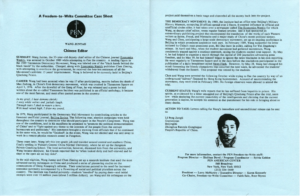
PEN International’s case sheet for Wang Juntao sent by fax and mail in 1990 to centers and members. In 1991 PEN International launched a Rapid Action Network to notify centers and to summarize the cases, actions and advocacy.
During this period PEN through its partnership with UNESCO convened writers in the Middle East and also writers in the Balkans to find common ground and to search out the pylons upon which bridges might be built and to monitor the situation for the writers in the regions. However, because of the Balkan War, it wasn’t possible to hold the meeting with the Yugoslav Centers in Bled as the Slovene Center had proposed. Instead PEN International President György Konrád hosted the gathering in Budapest and followed up with a meeting of South-Eastern European centers in Ohrid, hosted by Macedonian PEN though the Croatian Center wasn’t able to attend. The discussion included the desirability of recognizing the right of conscious objection in time of civil war and the possibility of solving the problem of minorities by allowing multiple citizenship.
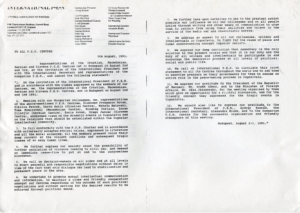
Summary statement of the August, 1991 Conference on the Balkans with all centers from the former Yugoslavia attending except the Bosnian Center, which didn’t come into being until the following year.
In addition to convening dialogues among writers and lobbying on behalf of threatened writers during the Balkan conflicts, PEN also provided financial assistance. Boris Novak, the Slovene Chair of PEN’s Peace Committee and President of Slovene PEN took many precarious trips into war-torn Sarajevo during the almost four-year siege of the city. At one point he reported at least 52 writers and their families were trapped and could only leave if invited to an international peace conference. Slovene PEN planned to host such a conference and invite the writers and their families with the hope the U.N. Peacekeeping Force could provide protection for their exit. He urged other PEN centers to assist in finding residences and perhaps temporary teaching appointments or fellowships for these writers. He also delivered aid to trapped writers, aid gathered from other PEN Centers, donated to the Writers in Prison Committee Aid Fund and to PEN’s Emergency Fund run out of Amsterdam with Dutch PEN.
In an intersection of conflicts, the German and Finnish publishers of Salman Rushdie’s Satanic Verses donated their proceeds from the book to PEN’s Writers in Prison Committee. By the Vienna Congress, Rushdie had lived 1000 days under death threat. PEN continued its defense of Rushdie and its protest against the accompanying violence of the fatwa. The Japanese translator of Satanic Verses had been killed, and the Italian translator badly beaten. (Two years later the Norwegian publisher was shot three times and left for dead.) The bounty had increased on Rushdie, and there was allegedly a hit squad deployed in Western Europe to assassinate him.
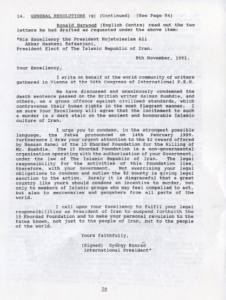
One of many letters sent by International PEN to support Salman Rushdie and to protest the ongoing fatwa.
My personal engagement and memories during this period focused on work with the Writers in Prison Committee and to a lesser extent with the formation of the Women’s Committee, which I supported but which others were driving, and with the establishment of the International PEN Foundation which would be able to receive tax exempt funds for many of these PEN activities. After a discussion of the Foundation’s framework at the Paris Conference, including assurances that the Foundation would not interfere or challenge PEN’s governance, I presented the formal proposal at the Vienna Congress where the Assembly of Delegates approved the establishment of an International PEN Foundation. The Foundation received official charitable status in March 1992 and operated for the next decade until British charitable tax laws changed and a separate foundation was no longer necessary.
Also at the Vienna Congress the Women’s Network, which had formed at the Canadian Congress in 1989, gained approval as a standing committee of International PEN with assurances that men and women were welcome and would work together. Meredith Tax, a chief strategist and one of the founders, explained the committee would involve more women in the work of PEN at all levels and address problems that particularly affected women writers in developing countries and would enable women to know each other’s work, much of which was not translated. “The Women’s Committee will be a force to strengthen, not weaken PEN,” she assured the Assembly.
The eventual governance of the Women’s Committee included PEN members from around the world and its chair rotated to different regions. Each of PEN’s standing committees had its own governing structure. The Women’s Committee was unique in its inclusiveness, which had its own challenges, but which foreshadowed a more inclusive governing structure for PEN International. Twenty-eight PEN centers signed up for the committee with 70 delegates and members, including men, attending the initial meeting.
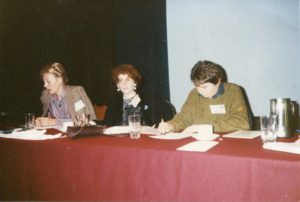
L to R: Moniika van Paemel, (Belgium Dutch-speaking PEN) and Meredith Tax (American PEN) at Women’s Committee Planning meeting at Canadian Congress, 1989
At the time International PEN’s leadership was all male. In its 80-year history International PEN had never had a woman President and only one woman International Secretary and few women as Committee chairs though in many centers of PEN there was a growing balance of men and women members and leaders. In 2015 novelist and poet Jennifer Clement was elected the first woman President of International PEN.
Next Installment: PEN Journey 8: Thresholds of Change…Passing the Torch